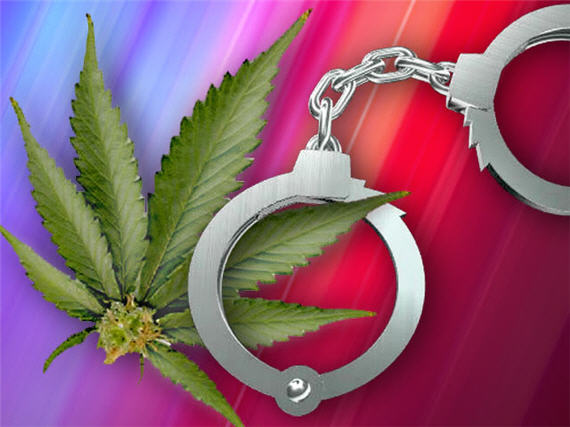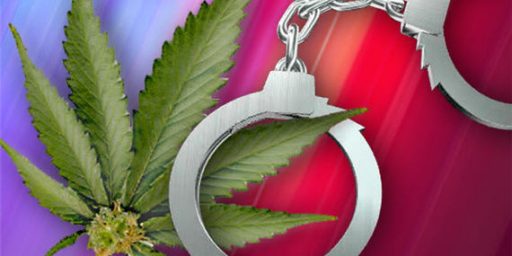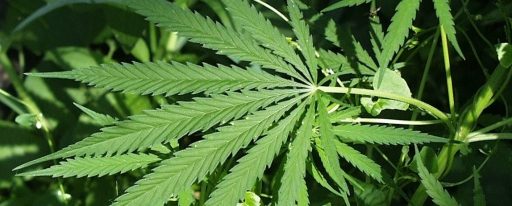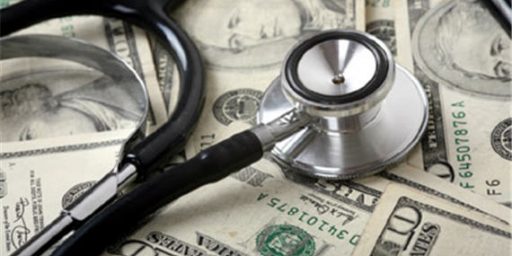War on Murder or War on Drugs: Pick One
Stony Brook finance prof Noah Smith writes, "The Single Best Anti-Gun-Death Policy? Ending the Drug War."
Stony Brook finance prof Noah Smith writes, “The Single Best Anti-Gun-Death Policy? Ending the Drug War.” After several paragraphs explaining why, even though he supports them, no plausible gun control measure will have a major impact on the murder rate, he turns to his thesis.
Reliable statistics on the number of drug-related murders in the United States are hard to come by. A 1994 Department of Justice report suggested that between a third and a half of U.S. homicides were drug-related, while a recent Center for Disease Control study found that the rate varied between 5% and 25% (a 2002 Bureau of Justice report splits the difference). Part of this variance is that “drug-related” murders are hard to define. There are murders committed by people on drugs, murders committed by addicts to get money for drugs, turf-war murders by drug suppliers, and murders committed by gangs whose principal source of income is drug sales.
But very few would argue that the illegal drug trade is a significant cause of murders. This is a straightforward result of America’s three-decade-long “drug war.” Legal bans on drug sales lead to a vacuum in legal regulation; instead of going to court, drug suppliers settle their disputes by shooting each other. Meanwhile, interdiction efforts raise the price of drugs by curbing supply, making local drug supply monopolies (i.e., gang turf) a rich prize to be fought over. And stuffing our overcrowded prisons full of harmless, hapless drug addicts forces us to give accelerated parole to hardened killers.
Ending the drug war would involve reducing all of these incentives to murder. Treating addicts in hospitals and rehab centers, instead of sticking them in prisons, would reduce demand for drugs, lowering the price and starving gangs of income while reducing their incentive to wage turf wars. Decriminalization would relieve pressure on our prison system, allowing us to focus on keeping violent people off the streets instead of pointlessly punishing drug users for destroying their own health. And full legalization of recreational marijuana — which is already proceeding quickly among the states, but is still foolishly opposed by the Obama administration — is an obvious first step.
In other words, yes, gun control is good. BUT don’t expect it to be a panacea for America’s gun violence problem. If we really want to save some of those 9,000 people, we need to end the self-destructive, failed drug policies that have turned us into a prison state and turned many of our cities into war zones.
Now, this can likely be filed into the category of ‘The solution to this problem everyone’s currently focused on is my pre-existing policy preference.” But Smith is surely right that a significant chunk of our murders—and of other major crimes, for that matter—are directly attributable to the prohibition on certain drugs.







My suggestion is, End the STUPID war on drugs ( which has been going on for over 130 years, sanFrancisco passed the first drug law in 1870s) then use those Officers to guard our schools, malls,etc. that would protect our children and save billions of dollars in taxes
Certainly the federal drug war should be ended ASAP, but the underlying article here laughably is oxymoronic. And not surprisingly the author of that article — safely ensconced on a college campus in the wealthy and gentrified burbs of a wealthy and gentrified county — has no f’n clue about urban realities.
If you decriminalize all drugs that means in turn they’ll be regulated by the government. And of course for public safety reasons the government is going to water down those drugs. So, what do you suppose hard core drug dealers will do? Will they go off to college, don business suits, and become bond traders? Um, no. They’ll remain in the drug trade. And they’ll tap into the hard core segment of users for whom the legal and thus regulated versions of narcotics are not enough. They’ll cut even harder versions of those drugs. They’ll be facing more competition too, obviously, since the government itself will be in the legal drug game. Their profit margins will be hurt. Their customer base will shrink. So the drug dealers will be fighting over a smaller pie.
If anything if you decriminalize all drugs the gun violence among drug dealers will increase.
The solution to spree shootings at schools is to have armed guards at schools. But now that the evil NRA has said exactly that the left-wing chattering classes reflexively will gainsay it and ultimately will fight against it.
Another key factor in reducing gun violence is to have fewer gun restrictions. More people with guns in their homes. More concealed and carry permits. Criminals are not stupid and generally speaking they prefer to stay alive. There aren’t high gun crime rates in places like Nebraska, the Dakotas, Texas and Oklahoma. That’s not coincidental.
The ultimate solution to reducing gun violence is to have less poverty. The higher the poverty rate in a given area the higher its rate of gun violence. And other crimes. And other maladies. This goes without saying.
To have less poverty we need better economic growth and more robust job creation. We need profitable businesses that want and need to hire more people. We need to maximize our economic capabilities. Freer trade. More exports. More coal production. More oil production. More gas production. Fewer regulations. End the shakedown lawsuit cottage industry. Lower taxes on businesses. Build nuclear power plants. Build more pipelines. Build more refineries. Build more LPG and LNG plants. Dam more rivers. Get more more people working.
A better economy means less problems of all stripes. It’s actually that simple.
Funny that when the Left talks about America’s “gun culture,” everyone understands it is a euphemism for rural, white (and mainly Southern) America.
But in fact, the overall homicide victim rate is six times lower for whites in America than for blacks. And the overall homicide commission rate for blacks is seven times higher than for whites.
Who says that? The Bureau of Justice Statistics (2005 data, the most recent I could find on the BJS website).
Furthermore, shootings are almost exclusively a same-race phenomenon between shooter and victim. More than 90 percent of black Americans killed or wounded by gunfire are shot by another black, and for whites the percentage is in the mid-80s.
Washington, D.C. and Chicago, both Democrat stronghholds with the severest gun restrictions in the country, are the nation’s leaders in shootings. And what almost no one will point out is that the vast majority of those shootings are black-on-black. Maybe we don’t know exactly the ratio of drug-related shootings to others, but ask any cop and he’ll tell you the ratio is extremely high.
In 2011, almost 5,300 children died from gunfire. That’s three Sandy Hooks every school week. The vast majority of those kids were black. Where was Obama’s or Bloomberg’s outrage then? The NYT’s? WaPo’s? Well, it was only black kids dying, yawn.
But when 20 white kids get gunned down, now we have to do something!
Gun control in America began as, and remains, entirely racist. As others have extensively documented, gun control began to make sure that freed blacks could not be armed. The gun-control movement today is focused almost solely on making sure that gun homicides and woundings stay concentrated among blacks.
@Tsar Nicholas:
I made one of my very rare visits to a bank yesterday and as I was standing in line, unarmed of course, it occurred to me that making banks gun-free zones makes no sense at all. After all, people like me who go there to do banking business – well, it what possible difference does it make whether we carry a concealed 9mm there or not? We’re not going there to rob the bank or commit any other crime. The pistol is not going to spontaneously jump from its holster and stick the place up or start firing randomly around the lobby.
Bank robbery is rare but it does happen. A bank robber goes there specifically to commit a crime. So of course he carries his gun into the gun free zone and uses it, either by threatening to shoot or actually shooting. The law abiding are unarmed and the criminals are armed.
One thing that criminal gun users and the Left have in common – they both want gun crimes’ victims to be helpless to resist.
I kind of think the problem is that we’re limited to guns. But some folks are bad shots. Just imagine if everyone had grenades – if someone pulled a gun on you, you could duck behind a car or desk, and heave the grenade at them. The military’s approach in restricted quarters is to use grenades and the like, not guns. Shouldn’t that be part of a well armed militia – ie citizens?
Same thing with IED’s. They should be sold in grocery stores – or at least hardware stores, as general home protection devices.
Yes, the drug war should end. It’s always been stupid.
Legalize everything. Sell through licensed, controlled means, like we do with alcohol today. The prices will drop through the floor, so keep them reasonably high with high taxes. Use the taxes to educate the population on drugs.
We did not reduce cigarette smoking by throwing smokers in prison. We did it primarily with education. Laws were used only to shield the non-smokers. That’s the obvious model to follow.
There would likely be a surge in use as people experimented with the previously forbidden, but then it would settle back down, quite possibly to levels lower than we currently suffer. The economic and family disruptions would be lower, the crime rate would plummet, prisons would empty, state coffers would grow.
It makes perfect sense and not 1% of the people in this country would support it.
I’m fine with pot legalization. I’m not sure that would defund the meth gangs.
… and I’m not sure I’d ever want legal meth.
Yes, end the drug war. But it won’t make a dent in the homicide rate. Drugs are illegal in the UK, too, but they have a much tinier rate of homicides because they’ve cracked down on guns.
@john personna:
Meth is very bad. But so is alcohol.
One of the features of an illegal drug is that customers tend to want the absolute biggest bang for their buck. The purchase process is expensive, often difficult, and dangerous and not an occasion to be repeated more than necessary, so I suspect it pushes them up the ladder to ever riskier drugs.
Alcohol by contrast can be purchased legally. Do we see drinkers pushing into higher and higher proof booze? No. We see beer and wine predominating. I’d guess there are thousands of beers sold for every fifth of whiskey. In fact, we’ve added all sorts of low-alcohol (low-calorie) beers and wines.
No way that the firearm companies will let the drug war end. They sell 2000 guns or so to drug cartels a day. Who knows how many guns are sold to the various police agencies and prisons set up to fight the drug war. The drug war is as good for business as the numerous suckers who line up to buy their 18th gun of their lives. (Shopping tip: What do you buy a man who has no imagination or desires and thus wants nothing? Why an AR-15: it solves everything!)
@michael reynolds:
I have no problem with legalized drugs, but saying the difference between pot (or doing coke or E once every couple months) and Oxycontin or meth is akin to the difference beer and scotch is way off the mark.
@michael reynolds:
I think it is much more common for “first samplers” to fall hard and fast with meth than with alcohol.
Perhaps with education you could reduce the number of people who “sample” meth, but it seems a rude approach.
In fact, it’s a little “invisible hand” isn’t it?
The war on drugs is stupid. Most illegal drugs, if regulated properly are a fraction as dangerous as buy crap on the street. It would dry up the money for the drug cartels, which would make Mexico very happy. As stated above, the taxes could be used to educate people on why drugs are bad. The harsher drugs (meth) could be better controlled and the manufacturing recess made safer, both in regards to the process itself as well as the end product. Also, structure the taxes so that while the price comes down overall, you keep the true poisons higher than the safer drugs. Why spend double for Mad Dog when you could get a decent scotch for less money?
I really need to stop posting on my IPad…
@john personna: Frankly people first do meth because they can’t get ahold of their preferred drug. After that it’s a hit or miss if the person becomes addicted to that high. I’m reasonably sure that the majority of meth users would switch to coke or any number of other drugs if they were available and cheaper. There will always be meth heads though and getting them treatment should be a goal.
I think it is naive and simplistic to think our violent crime rate would decrease if the WOD is ended. I think it is a good idea overall in the quest for liberty, but those who have been actively involved in the street pharmaceuticals industry, will turn to other violent criminal behavior in order to continue making the amount of money they are accustomed to having.
It is foolhardy to think that those who were making thousands of dollars a day peddling drugs are going to go get a job at the corner gas station and actually work at a job for eight hours a day. Instead, they will turn to robberies/home invasions/contract murder, etc. to make money quickly, which will either even out or result in an increase violent crime statistics, at least for the next couple of generations.
@Tsar Nicholas: And of course for public safety reasons the government is going to water down those drugs.
This is quite the leap as are your next few sentences, then I had to stop reading.
@Tsar Nicholas: @Ron: Right. After all, remember how violent crime soared after we ended alcohol prohibition? Oh wait…